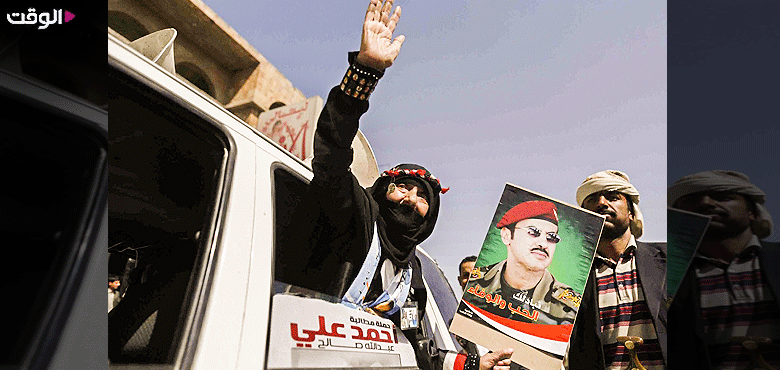Alwaght- Along with the relative stagnation on Yemen battlegrounds, the anti-Sana'a coalition of Yemeni and foreign actors is reviewing its alliances and reshaping its internal structures to adapt to the changes and dynamics happening in the game environment.
As part of these efforts, leaders of General People's Congress (GPC) have met in Abu Dhabi and took steps towards a peace initiative, reports suggested. One of the terms of the initiative was cutting off support to Abdrabbuh Mansour Hadi, removing him from presidency in the Aden-based administration, and replacing him with Ahmad Saleh, the son of the former President Ali Abdullah Saleh.
In April 2015, the UN Security Council imposed sanctions on Ahmad Saleh under Resolution 2216, accusing him of participating in activities that threaten peace, security and stability in Yemen. The sanctions imposed a travel ban on him.
However, a recent letter sent to the UN Secretary-General Antonio Guterres by Hadi's Foreign Minister Ahmad bin Mubarak and earlier negotiations with the former special UN envoy to Yemen Martin Griffiths demonstrated the Saudi and Emirati plans to ditch Hadi and bring to power the former president's son. Saleh's recent meeting with Netherlands ambassador to the UAE gave signs that the Western sides were preparing to lift his sanctions.
Elaph newspaper of Saudi Arabia in an article reported that Riyadh was pursuing Hadi removal from the political scene under the excuse of critical health and aging conditions. The newspaper noted that the most important current candidate to replace Hadi was Ahmad Saleh. It further said that the UNSC, including Russia and China, was moving in this direction and pursuing sanctions relief.
On the other hand, the UAE appointed Saleh president of the recent GPC conference as a replacement to Hadi in preparation to name him president of the ousted regime.
Earlier, media had revealed that Ahmad arranged an agreement among GPC's branch in the west coast, the UAE-backed militia there led by his cousin Tareq Saleh, and GPC's Sana'a branch led by Saleh Abu Ra'as.
Behind-the-scenes Riyadh-Abu Dhabi rivalry: End of alliance
The distrust between Saudi Arabia and the UAE is rising day by day and due to their struggle for own interests in Yemen as their strategies began to conflict. The clearest example is the UAE exit announcement from combat mission in Yemen, followed by clashes between the UAE-sponsored Southern Transitional Council (STC) and the Saudi-backed loyalists of Hadi in 2018 and expulsion of Hadi cabinet from Aden.
This division continues despite political shows of maintaining unity, such as the failed Riyadh agreement and hand shaking of Abu Dhabi Crown Prince Mohammed bin Zayed and Saudi Crown Prince Mohammed bin Salman in front of media during bin Zayed's recent visit to Riyadh. With the Emiratis seeking to grab the initiative from the Saudis and play as the leading foreign actor in southern Yemen developments, this division even goes wider.
Although the news leaked talk about an agreement between Riyadh and Abu Dhabi to oust Mansour Hadi from power, behind the scenes there is a fierce competition between the two countries to pick up close allies in the government of Aden. And Hadi ouster should be read a Saudi concession to save the failing anti-Sana'a front, amid catastrophic situation for the Saudis in the strategic Ma'rib and the daily drone and missile strikes by Ansarullah Movement on the Saudi territories. It should be mentioned that opposition to Hadi inside the Aden government's circles was high and in addition to the southerners, Tareq Saleh did not swear allegiance to Hadi either.
GPC's challenges to recover from past mistakes
Observers hold that the efforts to appoint Ahmad Saleh as the leader of the GPC at present is a difficult job, given the massive differences that tore apart the party.
Currently, the GPC is going through tough times due to fragile domestic conditions, lack of financial resources, and regional and international pressures.
The internal rift between the party leaders is one of the most important challenges facing the party leaders in restoring the place in Yemen developments. Currently, the GPC has relations with Sana'a, Cairo, and Riyadh.
Observers believe that the key challenge ahead of pro-unity efforts of the GPC is lack of a comprehensive leadership, at a time each of its leaders insist on their qualification for general leadership and replacement of the slain leader Ali Abdullah Saleh.
No matter how patriotic the slogans of the GPC expatriate leaders are. A majority of them abandoned their country and people while the latter suffered for over six years under war, blockade, hunger, and diseases, tied their interests to those of foreign actors, and walked a path of political decline.
Therefore, the top priority for the party leaders is to unlock from dependence on foreign powers that seek colonial goals in prevention of Yemen unity and independence.



























